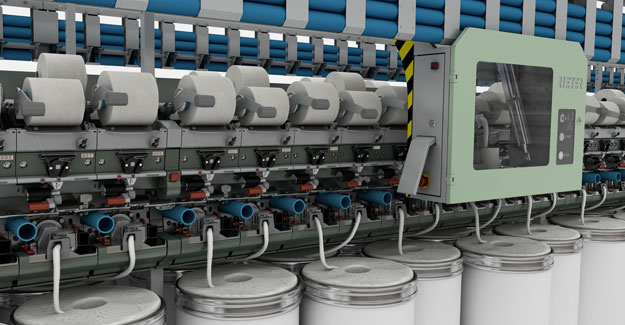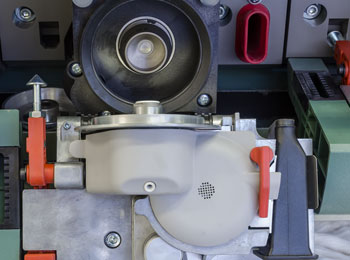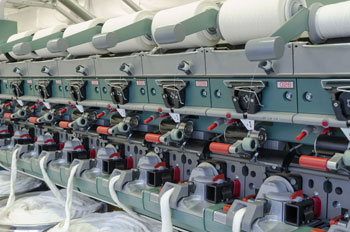
Rieter's Economical Rotor Spinning With More Flexibility In Raw Material Use
Semi-Automated Rotor Spinning Machine R 37
The Rieter rotor spinning machine R 37 has a new spinning box - with that the amount of trash extraction can be adapted to provide more flexibility in raw material use. With up to 600 spinning positions, low energy consumption, & time-saving operation, the R 37 is particularly economical. The robot ROBOdoff, which is available as an option, automates package changes. The most striking advantages of the R 37 are high productivity & flexible use of raw material based on its advanced spinning box technology. The design with independent machine sides offers additional flexibility. With an excellent spinning stability, the machine is able to produce yarn with delivery speeds of up to 200 m/min. It also distinguishes itself by very low energy consumption; thanks to a highly efficient drive system.
Save raw material cost
[caption id="attachment_19344" align="alignleft" width="350"] New redesigned spinning box with adaptable trash channel. (Fig 1)[/caption]
The redesigned spinning box has an exchangeable trash channel, allowing for a higher level of trash extraction. This new feature offers more options when selecting raw materials. Even with low-priced raw material, the machine is able to produce consistent & good yarn quality with a high tenacity; thanks to the optimised fibre flow (fig. 1).
The capability of the new spinning box has been proven with several customers globally, & the first new installations have been started successfully. The good experience at customer site proves the high flexibility in the usage of economical raw-material blends: With the R 37, it becomes possible to replace more expensive clean noil with less expensive waste.
An example showed that it is possible to use 52% noil and 48% waste (average cost 1.13 EUR/kg) for the production of a yarn of Ne 21. The predecessor model R 36 may have used 55% noil & 45% waste (average cost 1.16 EUR/kg). The resulting saving potential is about 2% of raw-material cost.
Maximum productivity with 600 spinning positions
The excellent spinning stability of the R 37 ensures high-volume production at a high production speed. The potential is enormous: With up to 600 spinning positions, yarn counts between Ne 3 & Ne 40 can be produced at a delivery speed of up to 200 m/min.
With ROBOdoff, which is available as an option, full packages can be changed automatically with no interruption to the spinning process. The robot ensures consistent package lengths within the defined tolerances.
Also, without ROBOdoff, the exceptionally low working height of the R 37 facilitates the work of operators. According to customer feedback, with 1 070-mm cans only about half the time is needed for the doffing of the complete machine compared to other machines on the market.
Similarly, the low working height of the machine combined with the piecing system AMIspin makes piecing easy and time-saving. As a result, more spinning positions can be served by one operator (fig. 2).
Up to 11% lower energy consumption compared to competitors
The highly efficient drive system of the R 37 ensures low energy consumption. An optional energy-monitoring device can assist to further optimise energy consumption.
Customers report lower energy consumption compared to several competitor machine models: For a cotton/waste blend of Ne 21 at a rotor speed of 95 000 rpm and a machine length of 500 spinning positions, 11% less kWh/kg were registered compared to the latest competitor machine model. Several customers confirmed that the R 37 has the same low energy consumption as the predecessor model R 36.
Less production stops with independent machine sides
[caption id="attachment_19343" align="alignleft" width="350"]
New redesigned spinning box with adaptable trash channel. (Fig 1)[/caption]
The redesigned spinning box has an exchangeable trash channel, allowing for a higher level of trash extraction. This new feature offers more options when selecting raw materials. Even with low-priced raw material, the machine is able to produce consistent & good yarn quality with a high tenacity; thanks to the optimised fibre flow (fig. 1).
The capability of the new spinning box has been proven with several customers globally, & the first new installations have been started successfully. The good experience at customer site proves the high flexibility in the usage of economical raw-material blends: With the R 37, it becomes possible to replace more expensive clean noil with less expensive waste.
An example showed that it is possible to use 52% noil and 48% waste (average cost 1.13 EUR/kg) for the production of a yarn of Ne 21. The predecessor model R 36 may have used 55% noil & 45% waste (average cost 1.16 EUR/kg). The resulting saving potential is about 2% of raw-material cost.
Maximum productivity with 600 spinning positions
The excellent spinning stability of the R 37 ensures high-volume production at a high production speed. The potential is enormous: With up to 600 spinning positions, yarn counts between Ne 3 & Ne 40 can be produced at a delivery speed of up to 200 m/min.
With ROBOdoff, which is available as an option, full packages can be changed automatically with no interruption to the spinning process. The robot ensures consistent package lengths within the defined tolerances.
Also, without ROBOdoff, the exceptionally low working height of the R 37 facilitates the work of operators. According to customer feedback, with 1 070-mm cans only about half the time is needed for the doffing of the complete machine compared to other machines on the market.
Similarly, the low working height of the machine combined with the piecing system AMIspin makes piecing easy and time-saving. As a result, more spinning positions can be served by one operator (fig. 2).
Up to 11% lower energy consumption compared to competitors
The highly efficient drive system of the R 37 ensures low energy consumption. An optional energy-monitoring device can assist to further optimise energy consumption.
Customers report lower energy consumption compared to several competitor machine models: For a cotton/waste blend of Ne 21 at a rotor speed of 95 000 rpm and a machine length of 500 spinning positions, 11% less kWh/kg were registered compared to the latest competitor machine model. Several customers confirmed that the R 37 has the same low energy consumption as the predecessor model R 36.
Less production stops with independent machine sides
[caption id="attachment_19343" align="alignleft" width="350"] Fully independent machine sides spin two lots simultaneously. (Fig 3)[/caption]
The R 37 has two independent machine sides, which can spin two different lots simultaneously. Two package conveyor belts prevent lots from being mixed up.This significantly reduces the number of production stops for lot changes. It is possible to stop one side, do maintenance work or change the lot, and start again, while the other side is continuously in production. Taking the example of new lots every week, a competitor machine with common drive needs 52 lot changes per year. The R 37 with independent drives only needs 26 production stops. This allows about 3% more production per year (fig. 3).
These features make the R 37 the perfect fit for spinners who count on high productivity while saving costs through low energy consumption and high flexibility in raw-material selection. Thanks to options such as the ROBOdoff, the R 37 can be adapted to the individual requirements of each spinning mill.
Fully independent machine sides spin two lots simultaneously. (Fig 3)[/caption]
The R 37 has two independent machine sides, which can spin two different lots simultaneously. Two package conveyor belts prevent lots from being mixed up.This significantly reduces the number of production stops for lot changes. It is possible to stop one side, do maintenance work or change the lot, and start again, while the other side is continuously in production. Taking the example of new lots every week, a competitor machine with common drive needs 52 lot changes per year. The R 37 with independent drives only needs 26 production stops. This allows about 3% more production per year (fig. 3).
These features make the R 37 the perfect fit for spinners who count on high productivity while saving costs through low energy consumption and high flexibility in raw-material selection. Thanks to options such as the ROBOdoff, the R 37 can be adapted to the individual requirements of each spinning mill.

Textile Excellence
If you wish to Subscribe to Textile Excellence Print Edition, kindly fill in the below form and we shall get back to you with details.












